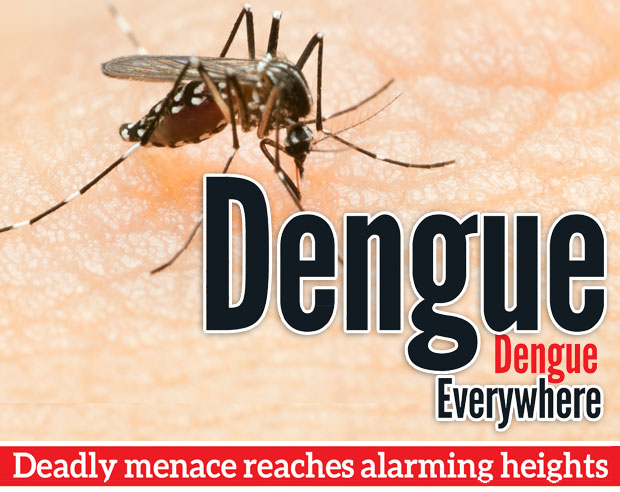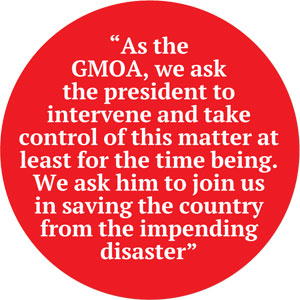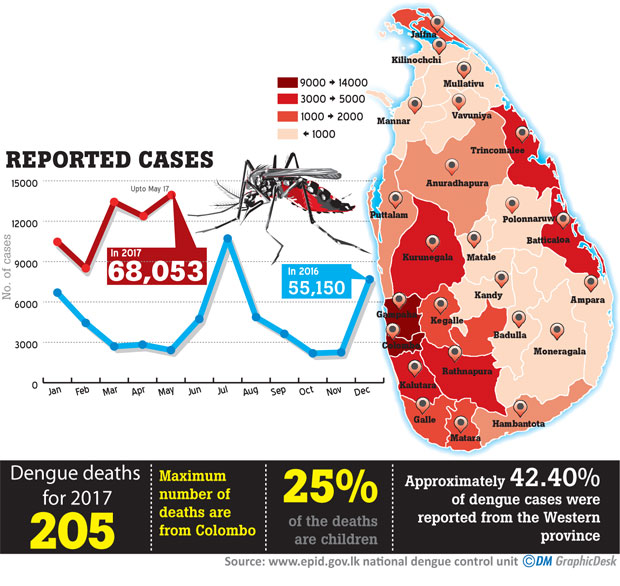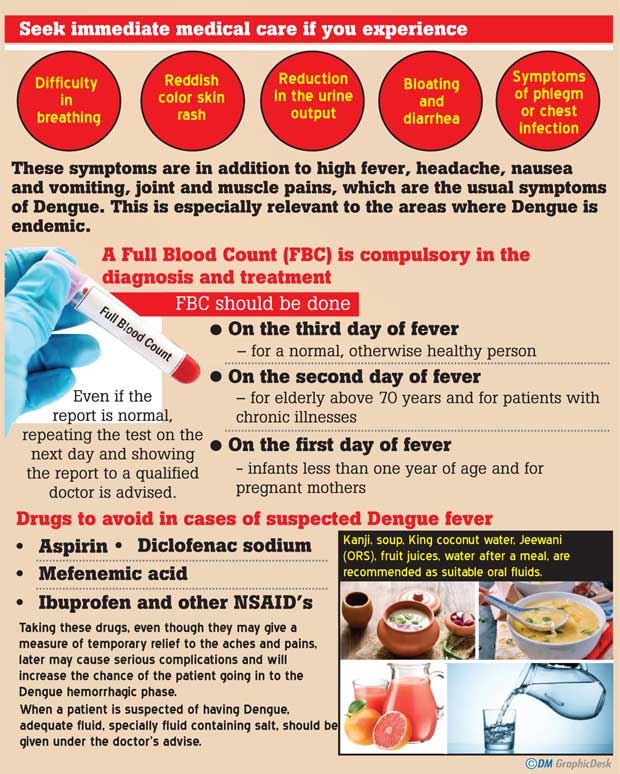Reply To:
Name - Reply Comment
Last Updated : 2024-04-25 00:00:00

 With over a whopping 67, 205 cases and some 200 deaths being reported countrywide, the Dengue menace has reached new heights. With June being the peak month to inflict the malady on innocent lives, efforts to eradicate the disease has intensified further. As the number of patients being hospitalised is on the rise, the Health Ministry and relevant authorities remain perplexed on how best to address the growing epidemic which has topped the list as one of the major national crises.
With over a whopping 67, 205 cases and some 200 deaths being reported countrywide, the Dengue menace has reached new heights. With June being the peak month to inflict the malady on innocent lives, efforts to eradicate the disease has intensified further. As the number of patients being hospitalised is on the rise, the Health Ministry and relevant authorities remain perplexed on how best to address the growing epidemic which has topped the list as one of the major national crises.
 According to a recent statement by Health Minister Dr. Rajitha Senaratne, the ministry is currently studying the possibility of importing ‘Wolbachia’ -- a newly-developed bacterium for Dengue control -- from Australia. It is believed that the bacterium combats the virus from replicating inside the mosquitoes, and that by getting Wolbachia-infected mosquitoes to mate and pass the bacterium to future generations, the cases of Dengue will diminish. Thus, given the fact that this plan works out, it could be surmised that mosquitoes carrying Wolbachia would fail to transmit the Dengue.
According to a recent statement by Health Minister Dr. Rajitha Senaratne, the ministry is currently studying the possibility of importing ‘Wolbachia’ -- a newly-developed bacterium for Dengue control -- from Australia. It is believed that the bacterium combats the virus from replicating inside the mosquitoes, and that by getting Wolbachia-infected mosquitoes to mate and pass the bacterium to future generations, the cases of Dengue will diminish. Thus, given the fact that this plan works out, it could be surmised that mosquitoes carrying Wolbachia would fail to transmit the Dengue.
Speaking to the Daily Mirror, several officials from the health sector explained the gravity of the situation whilst shedding light upon the baffling question: “why has the number of Dengue cases increased steeply in Sri Lanka during the recent past?” While underscoring the need for constructive engagement to battle this menace, they stressed the need to raise more awareness among the general public on this concern.




With Dengue patients spiking up in the monsoon season, more and more lives are being threatened every day. This increase is inevitable. Hospitals are flooding with Dengue patients, and what lies ahead is the challenge of reducing the number of deaths caused from this disease.
“The number of Dengue patients being hospitalised keeps increasing on a daily basis. Despite limited facilities, relevant authorities travel that extra mile to nurse and recuperate these patients. With the onset of the monsoon season, the number of Dengue patients augmented as anticipated. Our main aim right now is to reduce the number of deaths caused by Dengue.”
Against this backdrop props the question about Dextran 40, a drug used to treat Dengue patients, which might be running out of stock.
Dr. Hasitha assured that there were sufficient stocks at the moment, and that steps were being taken to ensure that there would be no shortage in future whatsoever.
“Currently, the drugs for Dengue are not in short supply. But we have made plans to ensure that necessary drugs will be available in future. We have to depend on the international supplier,” Dr. Hasitha said.
Despite limited facilities, relevant authorities travel that extra mile to nurse and recuperate these patients
However, with Dengue posing a serious threat to the lives of the people, the public is strictly advised to identify and eliminate Dengue breeding grounds in their surroundings. Dr. Hasitha advises patients to get a full blood count on the first sign of fever.
Drugs for Dengue are not in short supply. But we have made plans to ensure that necessary drugs will be available in future
“Seek medical attention on the contraction of fever as early as possible with a full blood count on time is of essence. Never resort to self-medication. Generally, painkillers and unprescribed drugs are not treatment for fever and should be avoided at any cost. On such occasions, patients could face serious hygienic complications including bleeding. Even on receiving medication, a patient should be aware if he or she has been prescribed painkillers and should avoid taking such drugs. It is just as important for the general public to stay vigilant and destroy mosquito breeding grounds. This should not be an isolated effort. Each and every individual in the country has to take the responsibility and act to control the Dengue menace.”



Hospital facilities available for patients are on verging limits with Dengue raising its ugly head in the most abrupt way this year. According to Professor Arjuna, despite concerns over a dearth of accommodation, Dengue patients are being treated as usual.
Dengue has risen like we have never seen before. The ‘Type 2’ Dengue virus is to also take the blame for this drastic rise
“Facilities at the Ragama Hospital are limited with respect to the number of Dengue patients. Although it is difficult, we are managing our patients. It is a struggle. Extended hospital facilities are the need of the hour. We do not require ventilators or more ICUs. What we need in particular are more high dependency units (HDUs). Currently, we have shifted some of the patients to the ICUs due to lack of space, even though they do not require intensive care. This occupies more space at ICUs which are required by patients in a more critical condition. More staff is also a must. Nurses should be extended to treat patients more effectively and efficiently. This will help us reduce the number of deaths caused by Dengue,” Prof. De Silva said.
The rise in the number of Dengue patients with the monsoon season has brought more devastating results than expected. Unknown modes of Dengue breeding have been uncovered by research. It has been surmised that Aedes aegypti, mosquitoes that transmit Dengue, possess the ability to breed in salty and dirty water. This causes a general perception that Dengue can only breed in clear, clean water to stand corrected also extending the range of potential mosquito breeding sites to which our attention has to be directed to.
“This year, Dengue has risen like we have never seen before. The ‘Type 2’ Dengue virus is to also take the blame for this drastic rise. Researches prove that Dengue mosquitoes can also breed in salty and impure water. Hence, controlling the severity of the Dengue situation in the country corresponds to managing a war at the moment. The conditions have worsened, particularly with the recent rains.”
Garbage situation in the country is definitely linked to the Dengue matter causing negative effects on the issue. We should approach an all-out ban on plastic that should include polythene bags in the least
Professor Arjuna pointed out that the development of a Dengue vaccine was underway.
“It will be awhile before the Dengue vaccine will be administered in the treatment of patients as it is still being developed and has not been tested out yet. But once done, the situation in the country will improve drastically. Other prevalent issues do not seem to help resolve this menace any further. For instance, can the garbage dilemma in the country aggravate the Dengue victim count this year?
“The garbage situation in the country is definitely linked to the Dengue matter causing negative effects on the issue. We should approach an all-out ban on plastic that should include polythene bags in the least. Efforts to control Dengue should continue as Dengue shows signs of remaining for a long time. The government should look into these concerns and take apt measures forthwith. But they alone cannot accomplish this. We have to assist as well.”



Refuting the allegations that the hospital has provided drugs other than Paracetamol to patients, Consultant Physician of the Infectious Diseases Hospital (IDH) Dr. Ananda Wijewickrama clarified that some private hospitals have engaged in such medical practice and that Infectious Diseases Hospital was not responsible for any such medical malpractice.
“Currently, an inquiry is being conducted by the ministry with regard to this matter. Government hospitals don’t administer any other drug except Paracetamol to its Dengue patients. Sometimes, patients tend to take drugs such as Diclofenac Sodium instead of Paracetamol either on their own accord or upon the directions of a private medical practitioner. Such things could lead into health complications in a Dengue patient,” he said.
Sometimes, patients tend to take drugs such as Diclofenac Sodium instead of Paracetamol either on their own accord or upon the directions of a private medical practitioner
Commenting on the number of Dengue patients being admitted into the hospital, Dr. Wijewickrama said despite there were no deaths reported, the number of Dengue patients being reported at IDH had increased significantly. He said all hospitals in Colombo were filled beyond their capacities with Dengue patients.



Dengue widespread has raised severe concerns throughout the island, and the World Health Organisation (WHO) share their thoughts on the outbreak. Dr. Sugandhika Perera voiced her concerns regarding the epidemic on behalf of the WHO.
“Dengue cases are increasing globally with more frequent and severe outbreaks. Effective mosquito control through active community participation and taking measures to prevent mosquito bites remain the mainstay of Dengue prevention. These measures need to be further strengthened, particularly in the identified high-risk districts, after experiencing the South West monsoons. Raising awareness among people to ensure they fully participate in preventing and removing vector breeding sites from the environment – their homes, workplaces and other surroundings are of critical importance. Additionally, people must take adequate personal protection measures to protect themselves against mosquito bites.” According to Dr. Perera, the WHO is closely monitoring the situation and liaising with relevant authorities to help control the Dengue uproar.
WHO has been supporting the government for building capacity of health staff on Dengue management, mosquito control measures and effective community awareness and engagement
“The WHO has been supporting the government for building capacity of health staff on Dengue management, mosquito control measures and effective community awareness and engagement. The WHO is liaising closely with the Epidemiology Unit, National Dengue Control Unit and Disaster Preparedness and Response Division of the Health Ministry to provide technical assistance required by the government.”



Dr. Prachila Samaraweera, Consultant Community Physician attached to the Dengue Control Unit, said fumigation was being carried out islandwide in areas that have been identified as Dengue breeding grounds.
“Currently, a rising number of patients have been reported from fourteen districts, among which Colombo, Gampaha, Galle, Matara, Kalutara, Hambantota, Puttalam, Kegalle, Kurunegala and Ratnapura have recorded a high number of Dengue patients. Therefore, instead of fumigating one selected location, we have decided to conduct a special fumigation programme according to a cluster method in selected locations. The fogging programme is carried out as either individual fogging or carpet fogging in these areas. Despite the importance of eliminating areas that are identified as mosquito breeding grounds through fogging, it should be noted that the effect of fogging would remain in the fumigated area only for about half an hour or so.
Instead of fumigating one selected location, we have decided to conduct a special fumigation programme according to a cluster method in selected locations
“Therefore, even if adult mosquitoes in the area are destroyed, if the location provides a favourable atmosphere for mosquito larvae, the total eradication of Dengue mosquitoes through fumigation would remain a futile effort. We have already taken steps to identify and destroy mosquito breeding sites with the cooperation of the military police, government institutes, health officials and the support of the general public. It is important to remove empty cans, tyres and containers from lying on the ground and dispose them properly because the adult female mosquito lays eggs in fresh water accumulated in such containers,”
Dr. Samaraweera said.
According to the Dengue Control Programme that would be conducted for three months as per the President’s directive, all schools have been advised to clean their premises once a week on every Friday for one hour which is currently being carried out in an effective manner. “We have also advised all institutes representing the public and private sectors to take similar initiation in their office premises. It is compulsory that patients who have fever for more than forty eight hours get themselves tested for a full blood count. Measures have also been taken to lower the charges of the full blood count to a maximum of Rs. 250 in private medical institutions,” Dr. Samaraweera added.



Speaking to, Sri Jayewardenepura General Hospital Director Dr. Susitha Senaratne said the situation with regard to administering Dengue patients was under control although they experienced a problem few days ago in accommodating patients.
“Dengue patients are being admitted to hospital, depending on the availability of beds. However, we see a significant rise in the number of Dengue cases although no deaths were reported from the Sri Jayewardenepura General Hospital during the recent past. Some unknown change may have triggered lately since the number of Dengue larvae has risen fourfold.
Rainfall, poor waste management systems as well as natural disasters like floods have further intensified mosquito breeding grounds islandwide. Also, mosquitoes bearing the ‘Type 11’ virus have increased over time, thereby making patients more vulnerable to the viral fever. We noticed that patients who were diagnosed with Dengue fever suffered from various complications than those who had contracted the disease for the first time. Our hospital staff is doing everything possible within their capacity to treat the patients,” Dr. Senaratne added.
Number of Dengue cases although no deaths were reported from the Sri Jayewardenepura General Hospital during the recent past
When inquired about the availability of Dextran, he said the drug was available in sufficient quantities. Further, he advised that patients should not be administered any pill other than Paracetamol since that could lead into other complications including excessive bleeding.



According to Government Medical Officers’ Association (GMOA) Assistant Secretary Dr. Haritha Aluthge, the Dengue situation in the country has already reached unacceptable levels. He sheds light upon a crucial point with regard to recent developments.
“With two hundred deaths per 60,000 Dengue patients, the death prevalence this year remains unacceptably high. Sri Lanka was able to reduce the Dengue death prevalence starting from 2012 until last year with the help of protocols, but this year, this value has reached almost double the value of last year,” he reveals.
“The government should take more interest in establishing the reason for this high number. Some of these deaths could have been prevented. So, they need to conduct district-level death reviews to go in depth to investigate the causes for these deaths,” Dr. Aluthge said, adding that doing so would help prevent such events from recurring in the future. According to Dr. Aluthge, some of these deaths had been caused by ‘Quacks’ who posed as qualified doctors. They have prescribed painkillers that contraindicate Dengue. When inquired if there was a connection between Dengue and garbage, two of the biggest crises the government is facing currently, Dr. Aluthge said there was so.
“Although the officials strive to attribute the ever-increasing number of Dengue patients to the change in the viral strain, entomological surveys have revealed an unacceptable increase in mosquito density in the past few months. The solid waste that is lying by the roadside without being collected definitely plays a big part in this. The government should have a national plan on garbage management, and the local authorities’ active participation should be ensured,” Dr. Aluthge stresses.
When questioned if the government had taken adequate measures to raise public awareness on this concern, Dr. Aluthge said: “The Health Ministry has recently focused most of its energy on whitewashing the name of SAITM via paid advertisements using public money. They should focus those efforts plus the money on raising awareness on crucial matters like Dengue on mass media, specially focusing on preventing deaths caused from Dengue,” he said.
The government should take more interest in establishing the reason for this high number. Some of these deaths could have been prevented
Dr. Aluthge also commented on the unequal distribution of resources by the government, taking as examples the situations where supplies like fogging machines and vehicles did not reach the areas where they were needed the most. He points out that this is due to the lack of a proper system for the ground-level information to reach administrative levels.
Commenting on the situation where there was an abundance of patients in some hospitals, he suggests that the government should use the underutilised wards in nearby hospitals to the National Infectious Disease Hospital and other major hospitals. “Specialist physicians and paediatricians should be assigned to those wards in a visiting basis,” he added presenting GMOA’s solution to the problem.
Further, he emphasised the need for a national-level plan to prevent further Dengue casualties which is more crucial than ever.
“One of the main reasons for the non-implementation of necessary plans is the lack of proper leadership within the Health Ministry. With the absence of a Health Secretary for more than two months and with an Acting Director General in place of a permanent one, the ministry has failed to achieve their maximum in a crisis situation like this. “We gathered the experts in both curative and preventative sectors of Dengue to one place for an action committee meeting held on Monday, since we see deficiencies in government intervention.
There were discussions about many crucial points like the ground-level participation in sending information, updating the current information gathering systems, and the final conclusions would be presented as a proposal to the government at the end of this week,” he added. Dr. Aluthge stresses that this is not a time to take sides but a time to put all differences aside, commenting that the Health minister is reluctant to work in unity with the trade unions.
“As the GMOA, we ask the president to intervene in this matter and take things into his own hands at least as a temporary measure. We ask him to join us to save the country from the impending disaster,” he concluded.
One of the main reasons for the non-implementation of necessary plans is the lack of proper leadership within the Health Ministry
Meanwhile, a confidential source who wished to remain anonymous from inside the Central Province healthcare sector divulged that the patient load in many of the main hospitals in the Central Province increased daily, reaching an uncontrollable level. The hospital staff and facilities are highly inadequate to manage the overwhelming number of patients, hence the staff is forced to discharge the patients as soon as they are out of the critical phase.
The source also pointed out that the growing problem of garbage in the Central Province as a main cause for the increasing Dengue incidence in the area, and stressed on the need of practicing proper disposal of garbage. The source also urged the government to take immediate action to supply the equipment like infusion pumps and necessary drugs to the needed hospitals as soon as possible.

Sri Lankan Thursday, 22 June 2017 08:24 AM
Why can't these dear mosquitos strike the for ever striking Doctors?

Add comment
Comments will be edited (grammar, spelling and slang) and authorized at the discretion of Daily Mirror online. The website also has the right not to publish selected comments.
Reply To:
Name - Reply Comment
US authorities are currently reviewing the manifest of every cargo aboard MV
On March 26, a couple arriving from Thailand was arrested with 88 live animal
According to villagers from Naula-Moragolla out of 105 families 80 can afford
Is the situation in Sri Lanka so grim that locals harbour hope that they coul